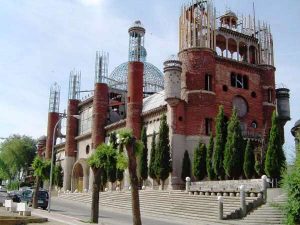
Sermon preached by the Rt Revd Steven Croft, Bishop of Oxford, at our Confirmation Service on 16th July, on 1 Cor. 3.1-15. It is the second of our sermon series on Paul’s letters to the early Christian communities. Bishop Steven’s original title for the sermon is “Christian Nurture.”
Thank you for your welcome and it is very good to be with you this evening.
I spent this morning at the Church of the Holy Spirit in Aylesbury. I was invited many months ago to bless their new building project. The project ran into some problems and is only half finished. But they wanted me to bless it anyway and to baptise and confirm candidates just like this evening.
As part of blessing the Church I had to climb up ladders onto the roof. The builder gave me a screwdriver and I had to fix in two screws as my contribution to the building project. I did warn the congregation afterwards that most of my DIY projects end in failure.
Nobody planned it that way but it seemed to me a very good thing to bless a half finished building. It’s a very good picture of the Church. What are we if not a Church under construction: a half finished community made up of imperfect and half finished people.
Paul would have recognised the picture all too well. He was a founder and builder of churches. He preferred to take the gospel where no-one had been before him.
In Acts 18, we read that he came to Corinth, a sea port on the narrow strip of land joining mainland Greece to the Pelopponese. Corinth is a crossroads of the world. Paul preaches there and founds a church. There is persecution but he is able to hold on and stay in the city for 18 months.
Then Paul travels on his way. But the life of the Church has only just begun. All kinds of people have come together in this new Christian community. They have very little to guide them. Even the gospels have not yet been written down. There are travelling preachers, like Paul, coming through, but some of them say different things. Who are they to believe? They have a huge amount still to learn and understand. Like Christians everywhere, it doesn’t take long before they start to quarrel and fight among themselves.
The tiny church meets in houses all over the city. Before long those houses have divided into factions. Some of the elders get together. They write to Paul and ask him for help. What they want most of all is for him to come and visit them and set things write. But Paul can’t do that.
And so Paul writes to the Church in Corinth these two very beautiful and very honest and at times very painful letters. He is writing, remember, to a church under construction: a half finished, half formed community.
The Letter to the Romans is like a manifesto. It’s written to people Paul has never met and it sets out his gospel from beginning to end.
The Letters to the Corinthians are like a manual for the life of the Church. The letters deal with real every day problems. How do we deal with division? With immorality? With spiritual gifts? How should we worship together? What’s the right way to celebrate the Lord’s Supper? Is it right to get married? Should we eat food offered to idols? Who gets to speak in a Church meeting? How should we handle our money? What do we say to those who mock the resurrection of the dead?
1 Corinthians answers all of these questions and more. Along the way Paul sets out some clear and wise principles for the life of any Church. I want to look at some of them this evening (not from the passage chosen but a chapter or so later from 1 Corinthians 3).
1 Corinthians 3 is headed divisions in the Church and it is partly about that. But 1 Corinthians 3 is also central to what is happening in our midst this evening as these candidates come to be confirmed.
In 1 Corinthians 3 Paul is trying to teach the Church in Corinth and every Church how to share our faith in Jesus Christ with those who want to know more. The Corinthians, like many of us, have become Christians in the recent past. They can remember what it is like not to have faith. But all too quickly they have forgotten what new Christians need if they are to come to faith and grow in faith.
Paul sets out to tell them and he does that by painting three beautiful and vivid word pictures to teach them how they are to be with younger sisters and brothers.
Every healthy church will have people who want to find out more about the church. If we are living as salt and light in the world and living out our faith, then people around us will be stirred up and want to know more.
What happens at that point is very, very important. Many churches, sadly, are really not very interested in helping enquirers and new Christians. There is very little teaching and special provision. People who enquire and ask questions in those churches don’t get very far. Very few people come to faith and in the end those churches decline.
Paul sets out a vision in 1 Corinthians 3 for every church to be a place where enquirers and new Christians find help. That vision is in these three pictures. I hope it’s a vision you can own as a Church this evening.
Each of the three pictures is very, very simple.
The first is a picture of parenting. Looking after new Christians, seeing them come to baptism, is like being a mum and dad.
I fed you with milk, not solid food, for you were not ready for solid food and now you are still not ready.
Paul looks back to his own days with the Corinthians. He reminds them that when he was with them, he created a special diet for them: milk not solid food. He fed them carefully. They couldn’t take mature teaching and some of them still can’t.
It is one of the most common misunderstandings about the life of the church: that someone can learn the faith simply by coming to our normal services. They can’t. People may find it helpful to come to church. Coming to church may raise questions. But all of us at that point in our journey need special provision, milk not solid food, and lots and lots of patient love.
If we want to help enquirers come to faith, to make disciples and to grow the church we have to become like parents to those who are enquiring and want to know more.
The second picture is also very homely. It’s a picture of farming or gardening. It’s a picture taken from the field or the allotment. It’s a picture of partnership. Listen.
I planted, Apollos watered but God gave the growth. So neither is the one who plants nor the one who waters is anything but only God who gives the growth.
There is partnership first of all between Christians in this work. It’s not something we can do alone. We all have a part to play. Paul will go on to talk about the body in 1 Corinthians and the way we all have different gifts.
But even more there is a partnership between Christians and Almighty God in this work. It’s more than a human task and understaking. In every life represented here this evening, I guess people will be able to point to people who have been helpful. But in every life here this evening, I guess people will be able to point to moments when God was at work in deeper ways than anyone can understand for that is what God does.
This work of nurturing faith and brining people to baptism is the task of the whole church, it’s a partnership, like farming.
The third picture is the one I started with. For you are God’s field, God’s building says Paul.
Again it’s a picture of partnership. According to the grace of God given to me, like a skilled master builder, I laid a foundation and someone else is building on it.
But there is even more going on that this. This time Paul is not just building with others. He is teaching the disciples how to build. The ones who build on the foundation here are not simply other teachers and ministers. They are the Christians themselves who take responsibility for their own Christian lives and for their growth to maturity. Together they are building the temple of the Holy Spirit, an enormous and beautiful building, a dwelling place for God.
We don’t build with God in the lives of others so they become dependent on us. We build people who grow to maturity, who are interdependent in the life of the Church, who become fellow builders with us of the kingdom of God.
These three pictures are unfolding before our very eyes this evening as these candidates come to baptism and confirmation.
As a church there are those who have helped them and parented them in faith. There are those who have sown the good seed of the gospel and watered it and seen it grow. There are those who are watching over them and teaching them how to build.
I hope this Church will be a place where many, many people find there way home to God. God said to Paul in Corinth according to Acts 18: “Do not be afraid but speak and do not be silent for I am with you…for there are many in this city who are my people”.
I pray you will set yourselves a vision to be a place where many find faith: where you are like parents; like farmers in partnership with God; a place where people build good and strong lives and that these candidates and many who come after them will be richly blessed.
Amen.
